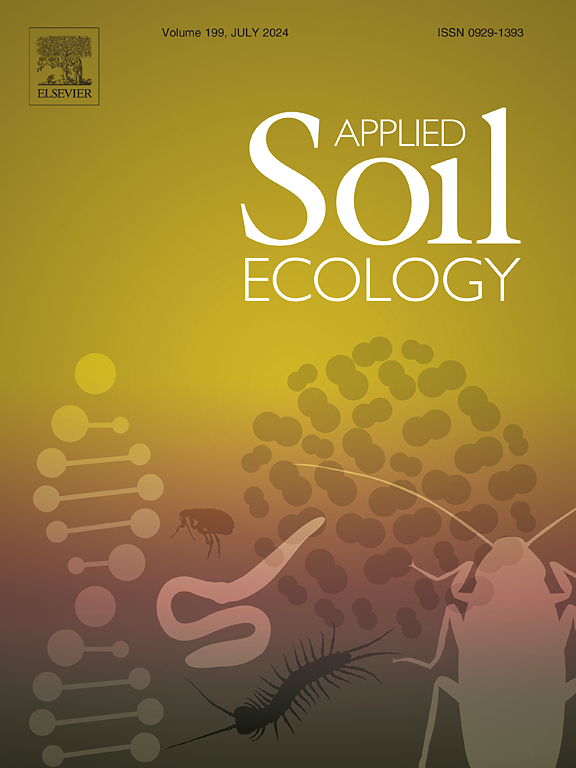Accumulation of metals and metalloids in soil cover, road dust, and their PM10 fraction in Ulan-Ude: Spatial variation and source apportionment
IF 5
2区 农林科学
Q1 SOIL SCIENCE
引用次数: 0
Abstract
Coal-fired thermal power plants remain one of the primary sources of electricity generation in the Asian part of Russia. However, coal combustion leads to severe environmental pollution. This study attempts to assess this impact in a large city in Eastern Siberia, Ulan-Ude, the capital of Buryatia, where coal is widely used in thermal power plants and for stove heating. The accumulation of trace metals (MMs) in the upper soil horizons, road dust, and their fine PM10 fraction was evaluated. The coal, ash, soil and road dust samples were analyzed using inductively coupled plasma-mass spectrometry (ICP-MS/AES) to determine concentrations of As, Bi, Cd, Co, Cr, Cu, Mo, Ni, Pb, Sb, Sr, V, W, and Zn. The coal was enriched only in Sr compared to world coals, while the ash was depleted in all these MMs. Concentrations of all MMs were higher than the local natural soil background values, with priority pollutants in Ulan-Ude's soils identified as Cu, Pb, Sb, Cd, Zn, and W. For the first time, the primary sources of MMs were quantitatively assessed using the PMF receptor model. It was established that most MMs (As, Ni, Cr, Sr, V, Co, Bi) originated from mixed sources, including natural sources and emissions from coal combustion. Its contribution accounted for 32.6 % for the bulk soils and 25.4 % for the PM10 fraction. The contribution of exhaust and non-exhaust emissions was estimated as 19.2 % and 22.4 % for bulk soils and the PM10 fraction, respectively. The spatial distribution of the Total Pollution Index (TPI) for soils indicated that the pollution degree was highest in private residential areas (mean TPI = 24), suggesting an influence of coal combustion conditions (including temperature) on contamination levels. The PM10 fraction of soil was most polluted in the railway transport zone (mean TPI = 46). Approximately 8 % of Ulan-Ude's territory displayed maximum, extremely hazardous levels of pollution in soils and their PM10 fraction, posing a risk to human health. Road dust was enriched in Sr, Sb and Pb compared to the continental upper crust values. Bulk road dust exhibited a low level of pollution, while the Total Pollution Index for its PM10 fraction reached an extremely hazardous level (TPI > 128). The highest pollution levels in road dust and its PM10 fraction were observed on main roads. In large industrial cities, pollution from coal combustion occurs alongside other significant sources, including vehicular emissions, contributing to the diversity of total pollutant emissions.
乌兰乌德市土壤覆盖物、道路扬尘及其 PM10 分量中金属和类金属的累积:空间变化和来源分配
燃煤热电厂仍然是俄罗斯亚洲地区的主要发电来源之一。然而,燃煤会导致严重的环境污染。本研究试图在东西伯利亚的一个大城市--布里亚特首府乌兰乌德--评估这种影响,该城市的热电厂和取暖炉广泛使用煤炭。研究评估了痕量金属(MMs)在土壤上层、道路尘埃及其 PM10 细颗粒物中的积累情况。采用电感耦合等离子体质谱法(ICP-MS/AES)对煤炭、灰烬、土壤和道路尘埃样本进行了分析,以确定 As、Bi、Cd、Co、Cr、Cu、Mo、Ni、Pb、Sb、Sr、V、W 和 Zn 的浓度。与世界上的煤炭相比,煤炭仅富含锶,而灰烬则贫含所有这些微量元素。所有 MMs 的浓度都高于当地自然土壤背景值,乌兰乌德土壤中的重点污染物被确定为铜、铅、锑、镉、锌和钨。结果表明,大多数 MMs(As、Ni、Cr、Sr、V、Co、Bi)来自混合来源,包括自然来源和燃煤排放。其在大体积土壤中占 32.6%,在 PM10 部分中占 25.4%。据估计,废气和非废气排放对大块土壤和 PM10 部分的贡献率分别为 19.2% 和 22.4%。土壤总污染指数(TPI)的空间分布表明,私人住宅区的污染程度最高(平均 TPI = 24),这表明燃煤条件(包括温度)对污染程度有影响。土壤中的 PM10 部分在铁路运输区污染最严重(平均 TPI = 46)。乌兰乌德约有 8% 的地区土壤及其 PM10 部分的污染程度达到了极度危险的最高水平,对人类健康构成了威胁。与大陆上地壳的数值相比,道路尘埃中的硒、锑和铅含量较高。散装道路尘埃的污染程度较低,而其 PM10 部分的总污染指数则达到了极度危险的水平(TPI > 128)。主干道上的道路扬尘及其 PM10 部分的污染水平最高。在大型工业城市中,燃煤污染与包括车辆排放在内的其他重要污染源同时存在,从而导致污染物排放总量的多样性。
本文章由计算机程序翻译,如有差异,请以英文原文为准。
求助全文
约1分钟内获得全文
求助全文
来源期刊

Applied Soil Ecology
农林科学-土壤科学
CiteScore
9.70
自引率
4.20%
发文量
363
审稿时长
5.3 months
期刊介绍:
Applied Soil Ecology addresses the role of soil organisms and their interactions in relation to: sustainability and productivity, nutrient cycling and other soil processes, the maintenance of soil functions, the impact of human activities on soil ecosystems and bio(techno)logical control of soil-inhabiting pests, diseases and weeds.
 求助内容:
求助内容: 应助结果提醒方式:
应助结果提醒方式:


